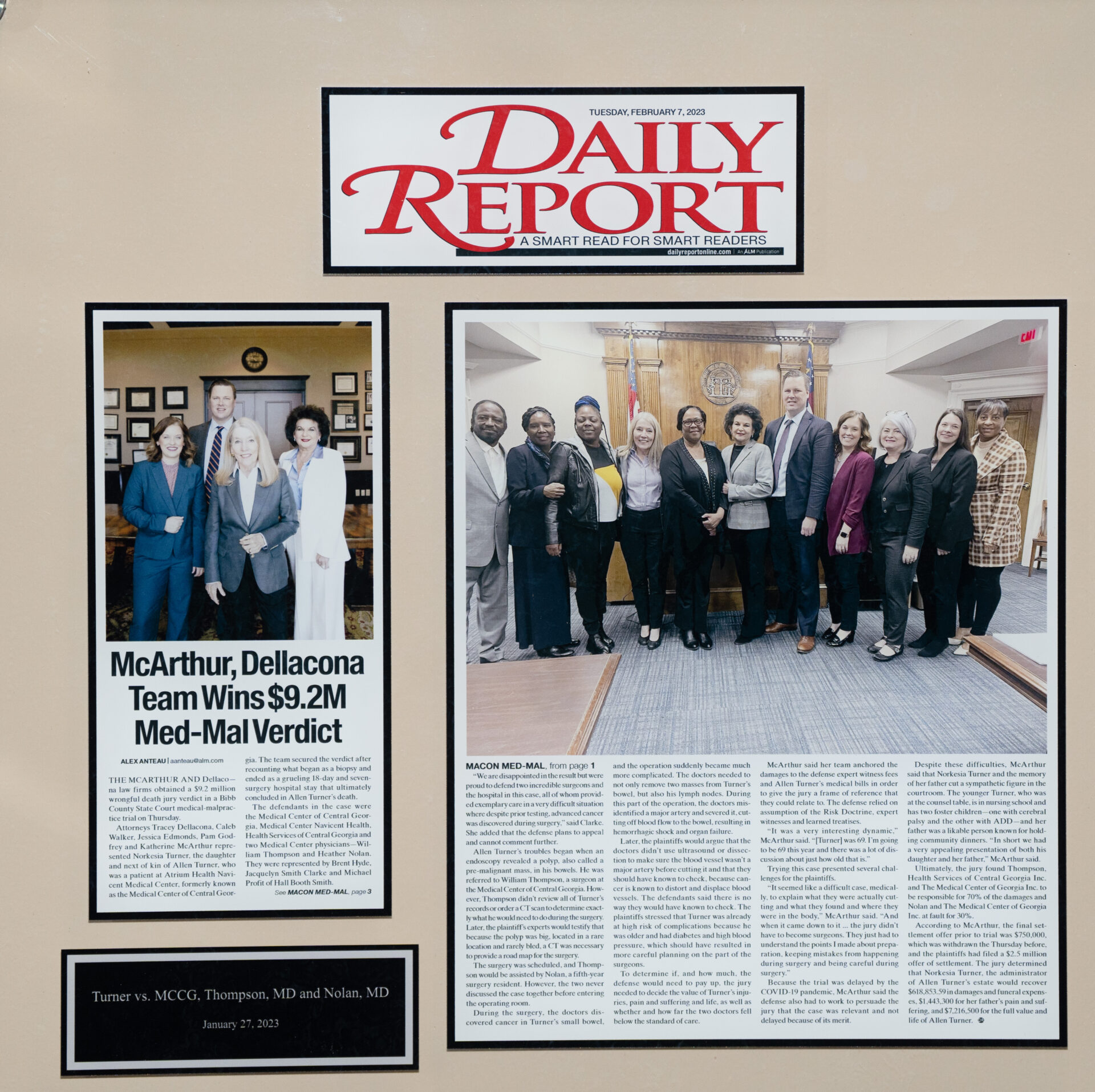original story by Alex Anteau of the Daily Report
THE MCARTHUR AND Dellacona law firms obtained a $9.2 million wrongful death jury verdict in a Bibb County State Court medical-malpractice trial on Thursday.
Attorneys Tracey Dellacona, Caleb Walker, Jessica Edmonds, Pam Godfrey and Katherine McArthur represented Norkesia Turner, the daughter and next of kin of Allen Turner, who was a patient at Atrium Health Navicent Medical Center, formerly known as the Medical Center of Central Georgia. The team secured the verdict after recounting what began as a biopsy and ended as a grueling 18-day and seven surgery hospital stay that ultimately concluded in Allen Turner’s death.
The defendants in the case were the Medical Center of Central Georgia, Medical Center Navicent Health, Health Services of Central Georgia and two Medical Center physicians-William Thompson and Heather Nolan. They were represented by Brent Hyde, Jacquelyn Smith Clarke and Michael Profit of Hall Booth Smith.
“We are disappointed in the result but were proud to defend two incredible surgeons and the hospital in this case, all of whom provided exemplary care in a very difficult situation where despite prior testing, advanced cancer was discovered during surgery,” said Clarke. She added that the defense plans to appeal and cannot comment further.
Allen Turner’s troubles began when an endoscopy revealed a polyp, also called a pre-malignant mass, in his bowels. He was referred to William Thompson, a surgeon at the Medical Center of Central Georgia. However, Thompson didn’t review all of Turner’s records or order a CT scan to determine exactly what he would need to do during the surgery. Later, the plaintiff’s experts would testify that because the polyp was big, located in a rare location and rarely bled, a CT was necessary to provide a road map for the surgery.
The surgery was scheduled, and Thompson would be assisted by Nolan, a fifth-year surgery resident. However, the two never discussed the case together before entering the operating room.
During the surgery, the doctors discovered cancer in Turner’s small bowel,
and the operation suddenly became much more complicated. The doctors needed to not only remove two masses from Turner’s bowel, but also his lymph nodes. During this part of the operation, the doctors misidentified a major artery and severed it, cutting off blood flow to the bowel, resulting in hemorrhagic shock and organ failure.
Later, the plaintiffs would argue that the doctors didn’t use ultrasound or dissection to make sure the blood vessel wasn’t a major artery before cutting it and that they should have known to check, because cancer is known to distort and displace blood vessels. The defendants said there is no way they would have known to check. The plaintiffs stressed that Turner was already at high risk of complications because he was older and had diabetes and high blood pressure, which should have resulted in more careful planning on the part of the surgeons.
To determine if, and how much, the defense would need to pay up, the jury needed to decide the value of Turner’s injuries, pain and suffering and life, as well as whether and how far the two doctors fell below the standard of care.
McArthur said her team anchored the damages to the defense expert witness fees and Allen Turner’s medical bills in order to give the jury a frame of reference that they could relate to. The defense relied on assumption of the Risk Doctrine, expert witnesses and learned treatises.
“It was a very interesting dynamic.” McArthur said. “[Turner] was 69. I’m going to be 69 this year and there was a lot of discussion about just how old that is.”
Trying this case presented several challenges for the plaintiffs.
“It seemed like a difficult case, medically, to explain what they were actually cutting and what they found and where they were in the body,” McArthur said. “And when it came down to it… the jury didn’t have to become surgeons. They just had to understand the points I made about preparation, keeping mistakes from happening during surgery and being careful during surgery.”
Because the trial was delayed by the COVID-19 pandemic, McArthur said the defense also had to work to persuade the jury that the case was relevant and not delayed because of its merit.
Despite these difficulties, McArthur said that Norkesia Turner and the memory of her father cut a sympathetic figure in the courtroom. The younger Turner, who was at the counsel table, is in nursing school and has two foster children-one with cerebral palsy and the other with ADD-and her father was a likable person known for holding community dinners. “In short we had a very appealing presentation of both his daughter and her father,” McArthur said. Ultimately, the jury found Thompson, Health Services of Central Georgia Inc. and The Medical Center of Georgia Inc. to be responsible for 70% of the damages and Nolan and The Medical Center of Georgia Inc. at fault for 30%.
According to McArthur, the final settlement offer prior to trial was $750,000, which was withdrawn the Thursday before, and the plaintiffs had filed a $2.5 million offer of settlement. The jury determined that Norkesia Turner, the administrator of Allen Turner’s estate would recover $618,853.59 in damages and funeral expenses, $1,443,300 for her father’s pain and suffering, and $7,216,500 for the full value and life of Allen Turner.







